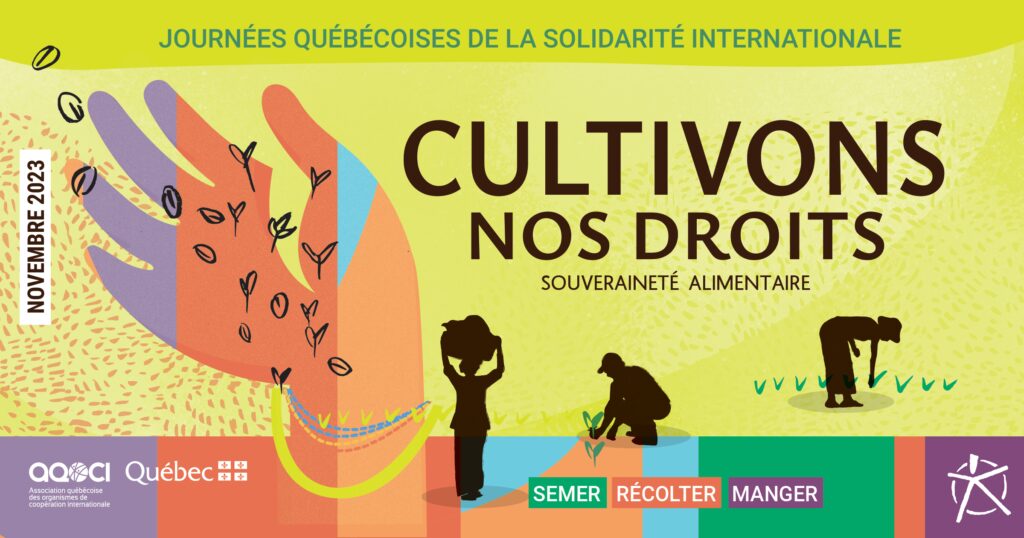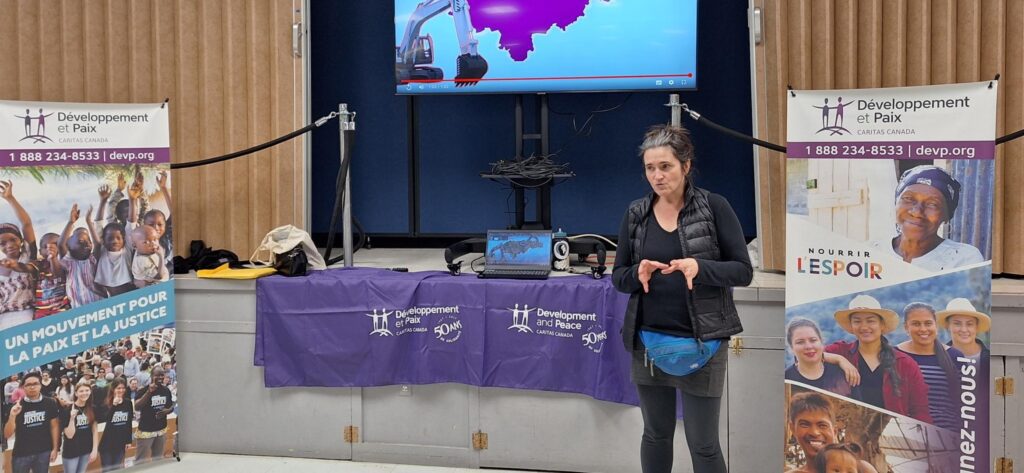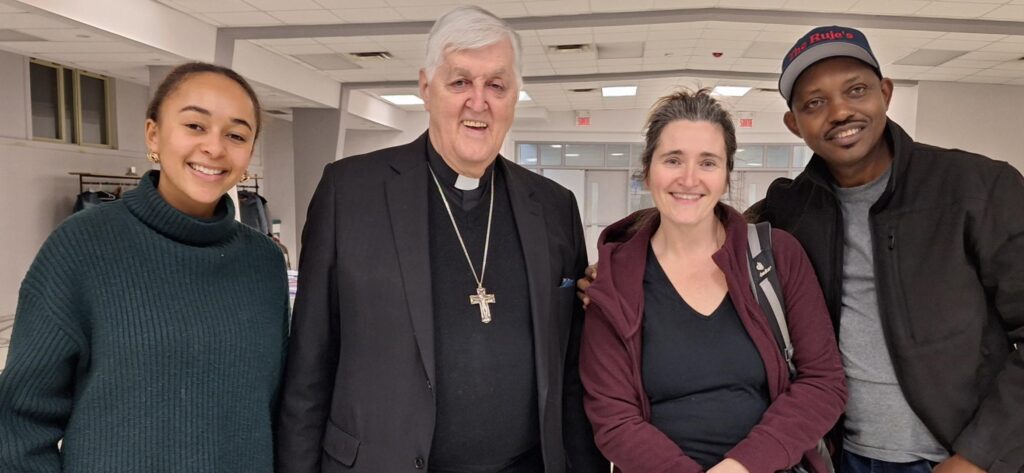At my eldest daughter’s school, when we buy a basket of locally grown organic vegetables, a second is given to less fortunate people in the neighbourhood through a Christmas fundraiser. This summer, a quarter of the harvests from the community garden were also set aside for them. Such small collective initiatives are good examples of addressing an issue that is still too often neglected: the right of everyone to eat healthily and to their heart’s content and our duty as citizens to ensure that they can.
By Philippe Lafortune, Animator for Central and Southern Quebec


As we saw and experienced during the Coronavirus pandemic, health and humanitarian crises are exacerbating the already precarious conditions of women, men and children in every corner of the globe. While we, too, have seen prices rise in grocery stores here, they have doubled, if not increased tenfold elsewhere. When you are already struggling to feed your family, what can you do when prices nearly triple, as they have in Somalia?
November may be gray, but the (JQSI; Quebec International Solidarity Days; see French website) shed light on an essential, existential issue: food sovereignty. In other words: the right of peoples to define their own agricultural policies, to control their own natural resources and to enjoy healthy food that respects their communities, ecosystems and cultures.
Ten years ago, our Sow Much Love campaign highlighted how small-scale family farming feeds the world―literally 80 per cent of the global population. Yet, current international trade rules and procedures threaten these small-scale local family farms to make way for export-oriented monocultures, polluted ecosystems, the monopolization of resources and profiteering.
To slow down, halt or even reverse this trend, Development and Peace ― Caritas Canada has joined forces, as it does every year, with the Association québécoise des organismes de coopération internationale (AQOCI; Quebec Association of International Cooperation Organizations; see French website) to organize public awareness and mobilization activities across Quebec on the crucial issues of the right to water, land, food, health and life.
Reaping our Rights
The Peasant struggles from here and abroad event (see French blurb), co-organized with the Centre international de Solidarité ouvrière (International Centre for Worker Solidarity; see French website), the Comité pour les Droits humains en Amérique latine (Committee for Human Rights in Latin America; see French website) and Solidarité Laurentides Amérique latine (SLAM), featured a panel of partners from Mexico, Haiti, Guatemala and Honduras, who helped attendees better understand how food sovereignty is threatened by transnational corporations.
Elvin Hernandez, a human rights investigator who works for our Honduran partner ERIC-Radio Progreso (see Spanish website), spoke of the irrationality of extractivism in Honduras, referring particularly to the case of the Guapinol community, which is fighting to defend its rivers, life and territory from illegal mining in a national park and from intensive palm monoculture in its region.
Such economic models, unfortunately widespread in the countries where we work, exclude local communities from any royalties and from decisions that affect them. Instead, they promote a society of overconsumption and, ultimately, an inequitable system that is as unviable as it is unsustainable. While every case is unique, in Guapinol as elsewhere, the generally chronic trend is towards the misappropriation of resources and the concentration of wealth.


The day before this event, our Latin America programs officer, Anne Catherine Kennedy, had presented views from the Global South during a webinar on food sovereignty (see blurb in French). The previous week, an event entitled Food sovereignty: let’s cultivate it! (see blurb in French) had enabled participants to test and deepen their knowledge of issues relating to the right to land and food.
Food sovereignty in action
Beyond mere statistics, food sovereignty is a life-and-death matter for millions of women, men and children like our own. It is also a question of conscience and solidarity for the members and friends of Development and Peace ― Caritas Canada, who, for 55 years, have been supporting the sustainable development projects of local partner organizations that are firmly rooted in their communities.
In the Sahel, a region affected by political, economic and climatic instability, our food security project supports the sustainable and inclusive management of natural resources, as well as the production, processing and marketing of agricultural, forestry and fishery products. Of the 100,000 participants in Burkina Faso, Mali and Niger, four out of five are women, and half are aged between 18 and 35.
In Burundi, our three-year project announced this autumn will enable 7,000 people to adopt agroecology to better adapt to climate change and meet their basic needs. In Somalia, where the worst drought in 40 years is threatening half the population with famine, our support will help our partner Trócaire provide nutritional services to almost 10,000 parents and carers.
Closer to home, six Saskatchewan farm families committed this summer to donate the proceeds from growing 421 acres of crops to malnourished families in Somalia, through the Canadian Foodgrains Bank’s growing project, which also supports Trócaire and which had organized a solidarity visit last May that had included delegates from our international programs department.
Examples of solidarity are as plentiful as needs on the ground. The new Development and Peace ― Caritas Canada website launched this fall offers an overview of our activities in Canada and our projects around the world, all promising initiatives that each and every one of us can learn more about and get involved in.
Get informed and get involved


Because we protect better that which we appreciate, and because we can fight better the “enemy” we know and understand, education is truly the key to development, both here and in the Global South. That is why the 28th edition of the JQSI this November offered a host of informative face-to-face and virtual activities designed to foster year-round community commitment to the changes needed to ensure food sovereignty for all.
To raise awareness and mobilize people, especially youths, around the issues of food sovereignty, global hunger and solidarity solutions, AQOCI offers a youth workshops entitled Nous sommes la transition (We are the Transition; see French web page). Development and Peace ― Caritas Canada, too, offers a number of educational activities, such as the Food Art Game and the popular curricular resources.
Development and Peace ― Caritas Canada’s audiovisual resources, like those of its partners like ACA in Colombia (see Spanish YouTube channel) and ERIC-Radio Progreso in Honduras (see Spanish YouTube channel) are also a mine of information to discover and share. A great example is the still relevant documentary, On the Road to Food Sovereignty, which portrays the progress made two years after the devastating Haitian earthquake of January 2010.
Already, many of our actions are helping ensure our food sovereignty and that of our sisters and brothers everywhere on this planet. These include buying local, organic, fair trade; reducing food waste; demanding federal corporate due diligence legislation to protect communities and the ecosystems on which they depend for their livelihood and survival.
We chose to Stand for the Land in 2023 and we will be Reaping our Rights in 2024. In this second campaign under the five-year Create Hope theme, we will take meet partners from Bolivia, Indonesia, Tunisia and Nigeria.
Our food sovereignty, like that of our sisters and brothers, requires us to choose modes of consumption that respect the communities and ecosystems that produce our food. Rights and democracy can never be taken for granted. Like the Earth, the fields, the garden, spirit, love and hope, we have to cultivate them together every day.

